Fuck his mother's black cheebye.
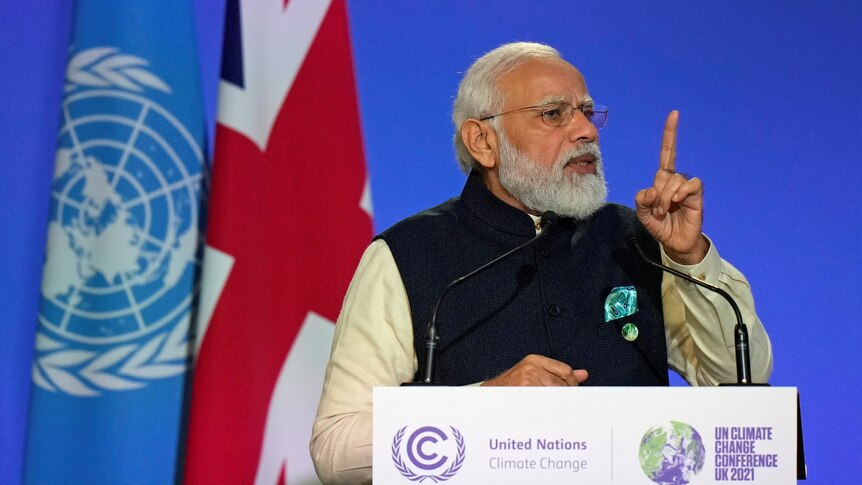
Scientists say the world needs to halve global emissions by 2030 and reach net zero by 2050 to avoid the worst impacts of climate change.(Pool via Reuters: Alastair Grant)
ndia's Prime Minister has announced 2070 as the target for his country to reach net zero carbon emissions, two decades after the US and Australia and 10 years later than China.
Narendra Modi made the surprise announcement at the UN COP26 climate summit in Glasgow.
Only last week, India, currently the world's third-biggest emitter of greenhouse gases after China and the United States, rejected calls for a net zero carbon emissions target.
It said it was more important for the world to lay out credible pathways to reduce emissions.
Mr Modi said India expects wealthy countries to give $US1 trillion ($1.33 trillion) in climate finance, far more than the $US100 billion ($132 billion) promised but not yet delivered.
Mr Modi said the 2070 target was one of five measures the country planned to undertake to meet its commitments under the Paris climate accord.
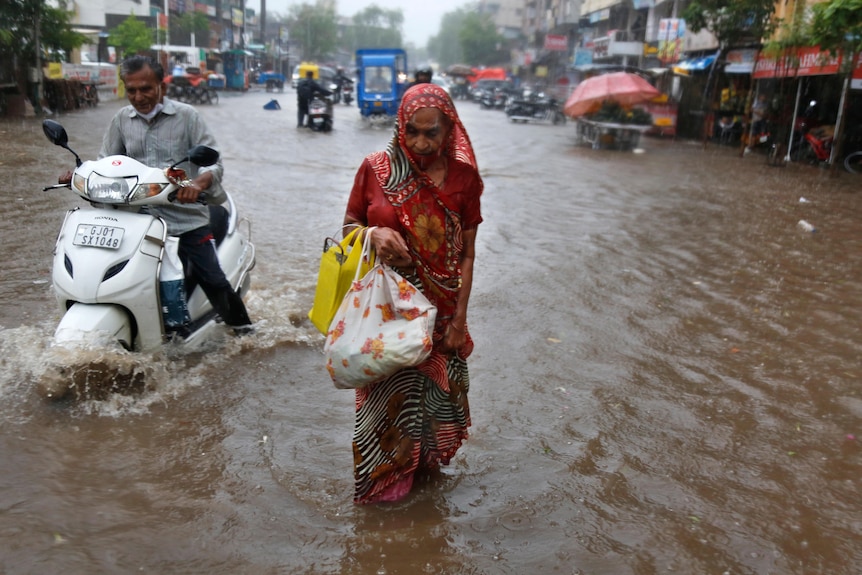
Heavy rains from Cyclone Tauktae lashed Ahmedabad, India, in May this year. (AP: Ajit Solanki)
Scientists say the world needs to halve global emissions by 2030 and reach net zero by 2050 to avoid the worst impacts of climate change.
The pledges made so far would allow the planet's average surface temperature to rise 2.7 degrees Celsius this century, which the United Nations said would supercharge the destruction that climate change was already causing.
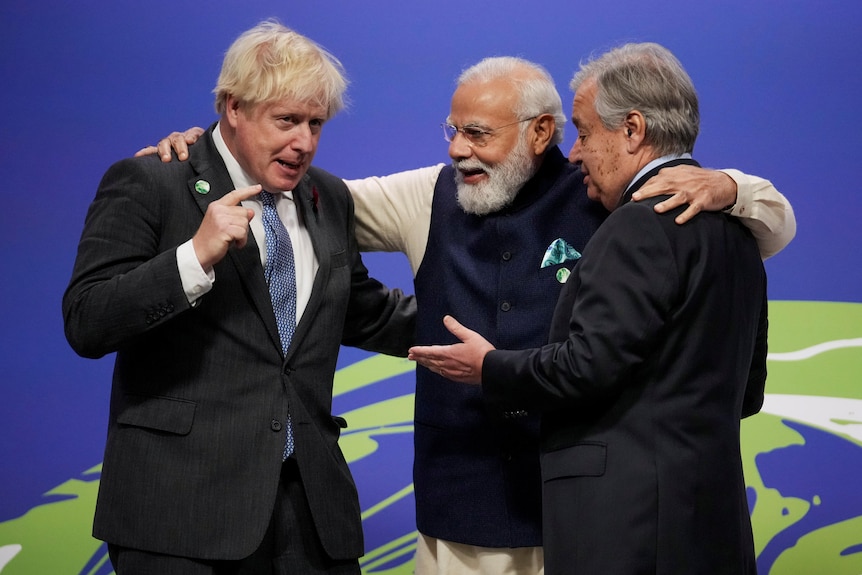
Experts say the net zero target is significant, after India rejected calls to set a target just a week ago. (Pool via Reuters: Christopher Furlong )
Mr Modi defended India as having stuck to its climate pledges "in spirit and letter".
He noted that though India represented 17 per cent of the world's population, it was "responsible for only 5 per cent of global emissions".
Let the ABC Chatbot break it down for you.
Mr Modi told other world leaders that India would increase the share of renewables in its energy mix from about 38 per cent last year to 50 per cent by 2030.
"India has increased its non-fossil fuel energy by 25 per cent, and this now represents 40 per cent of our energy mix," he told leaders.
"More people travel on the Indian railways every year than the entire population of the world. This huge railway system has committed to attain net zero by 2030. This initiative alone will reduce carbon emissions by 60 million tonnes annually."
In his speech, Modi also called for a global push to adopt sustainable lifestyles.
"Instead of mindless and destructive consumption we need mindful and deliberate utilisation," he said, citing consumer choices in areas from packaging to diet.
"These choices, made by billions of people, can take the fight against climate change one step further," he said.
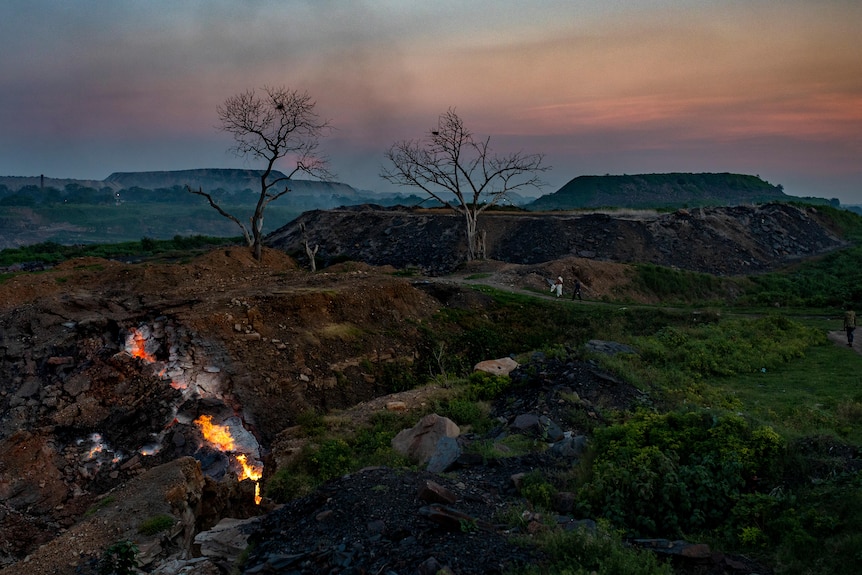
India is vulnerable to the effects of climate change, experts say.(AP: Altaf Qadri)
Ulka Kelkar, who directs India's climate policy analysis for the World Resource Institute, said it would be similar to the US and Europe adopting net zero goals 20 years ago.
The Council on Energy, Environment and Water (CEEW), a think-tank based in Delhi, previously released a report suggesting 2070 to 2080 was a realistic time frame for India, with dependence on coal and other fossil fuels expected to peak in 2040.
That group's chief executive, Dr Arunabha Ghos, welcomed Mr Modi's move, saying it was "backed up by strong climate ambition in the near-term", citing Mr Modi's 2030 targets, including 500 gigawatts of non-fossil fuel capacity and one billion tonnes of emissions reductions by the end of the decade, among others.
"India has clearly put the ball in the court of the developed world. This is real climate action," he said.
"Most importantly, India has called, once again, for a change in lifestyles. If we cannot fix how we live, we cannot fix how we live on this planet."
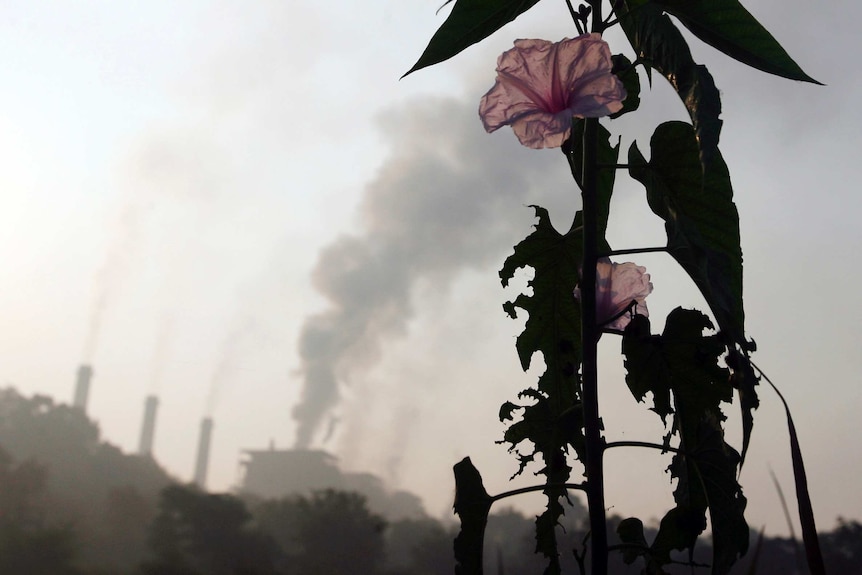
About 70 per cent of India's electricity is generated with coal.(Reuters: Arko Datta)
Sandeep Pai, a senior researcher at the US-based Centre for Strategic and International Studies, said the announcement was a surprise to even some in government, but a pleasant one.
He said India was "one of the most vulnerable countries to climate change", adding it was critical for India to make its cities resilient to future climate events, both slow-onset ones like droughts, but also extreme weather events like deadly floods.
Professor Navroz Dubash from the Centre for Policy Research said there was an "air of inevitability" about the 2070 pledge.
"There's been a drumbeat of kind of pressure in the last sort of major economy to not have a net zero target," he said.
"The real problem with the emergence of net zero as the single benchmark of whether a country is serious or not is that it's too easy to just say, 'Yes, we will do something off in the future, and not give anything concrete about what that something is," he said, referring to Australia, India and Saudi Arabia.
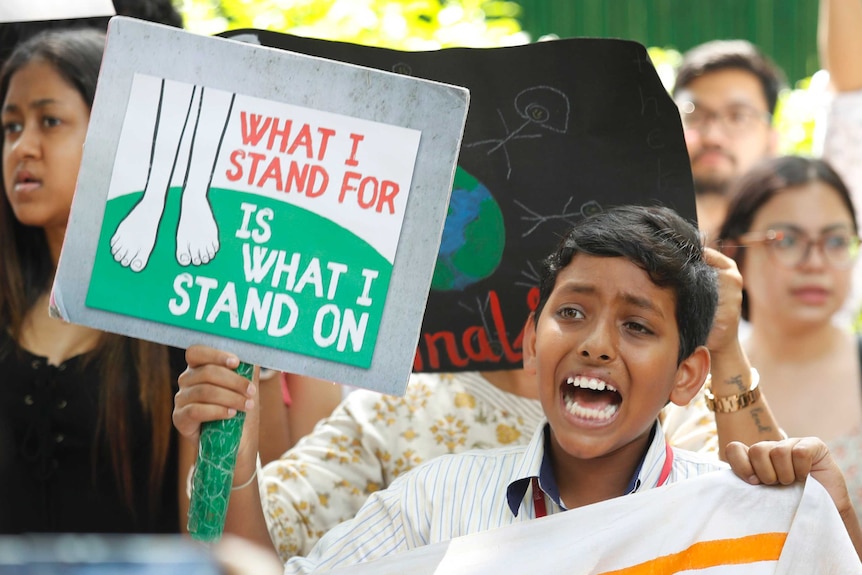
Experts say there needs to be steps to convert climate pledges into tangible actions. (AP: Manish Swarup)
He said that, while Mr Modi said India would fulfil 50 per cent of its energy requirements from renewables by 2030, there was a lack of clarity around important nuances of whether he was referring to electricity or energy, or capacity or generation.
But, he said, the 2030 commitment from the railway sector was more concrete and more likely to drive policy.
"That's the direction India should go — concrete, specific, sector-by-sector, low carbon approaches that bring together development and a low carbon future."
Dr Pai said an Indian person's energy consumption was 8 per cent of that of a person in the US, but that was set to triple in future.
Apart from climate finance, barriers to India meeting the target include its young fleet of coal power plants and the need to ramp up renewables on such a large scale to cater for its 1.4 billion people.
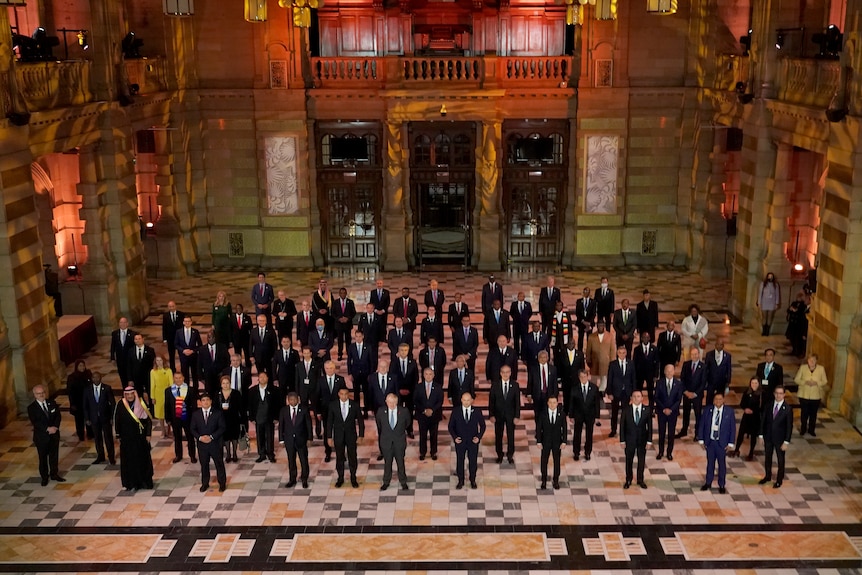
World leaders have gathered in Glasgow for what's been called the earth's "last best chance" to tackle climate change.(Pool via Reuters: Alberto Pezzali)
"India has to think about how to not only transition technologically to renewables, but also manage millions of workers, communities, and states that are deeply dependent on coal, which is a very long-term process," he said.
"It is truly ambitious for a country like India … It is at the centre of global energy systems with a country that is going to see massive energy demand going into the future.
"The devil will be in the details of how India plans to achieve all that in the short term, in the next five years, in the next 10 years, and then beyond."
Indian PM Narendra Modi commits to net zero emissions by 2070, asks for $1 trillion in climate finance
Posted 53m ago53 minutes ago, updated 20m ago20 minutes agoScientists say the world needs to halve global emissions by 2030 and reach net zero by 2050 to avoid the worst impacts of climate change.(Pool via Reuters: Alastair Grant)
ndia's Prime Minister has announced 2070 as the target for his country to reach net zero carbon emissions, two decades after the US and Australia and 10 years later than China.
Key points:
- Narendra Modi has asked wealthy countries to contribute $US1 trillion in climate finance
- The 2070 target falls 20 years after Australia's and 10 years later than China's
- But some experts say it's a bold and realistic target for India's 1.4 billion people
Narendra Modi made the surprise announcement at the UN COP26 climate summit in Glasgow.
Only last week, India, currently the world's third-biggest emitter of greenhouse gases after China and the United States, rejected calls for a net zero carbon emissions target.
It said it was more important for the world to lay out credible pathways to reduce emissions.
Mr Modi said India expects wealthy countries to give $US1 trillion ($1.33 trillion) in climate finance, far more than the $US100 billion ($132 billion) promised but not yet delivered.
Mr Modi said the 2070 target was one of five measures the country planned to undertake to meet its commitments under the Paris climate accord.
Heavy rains from Cyclone Tauktae lashed Ahmedabad, India, in May this year. (AP: Ajit Solanki)
How does India compare to other countries?
The United States, Britain, the European Union and Australia have set a target date of 2050 to reach net zero, while China, Russia and Saudi Arabia have set targets of 2060.Scientists say the world needs to halve global emissions by 2030 and reach net zero by 2050 to avoid the worst impacts of climate change.
The pledges made so far would allow the planet's average surface temperature to rise 2.7 degrees Celsius this century, which the United Nations said would supercharge the destruction that climate change was already causing.
Experts say the net zero target is significant, after India rejected calls to set a target just a week ago. (Pool via Reuters: Christopher Furlong )
Mr Modi defended India as having stuck to its climate pledges "in spirit and letter".
He noted that though India represented 17 per cent of the world's population, it was "responsible for only 5 per cent of global emissions".
What’s COP26? Ask the ABC News bot
LET THE ABC CHATBOT BREAK IT DOWN FOR YOU.: WHAT’S COP26? ASK THE ABC NEWS BOTLet the ABC Chatbot break it down for you.
Mr Modi told other world leaders that India would increase the share of renewables in its energy mix from about 38 per cent last year to 50 per cent by 2030.
"India has increased its non-fossil fuel energy by 25 per cent, and this now represents 40 per cent of our energy mix," he told leaders.
"More people travel on the Indian railways every year than the entire population of the world. This huge railway system has committed to attain net zero by 2030. This initiative alone will reduce carbon emissions by 60 million tonnes annually."
In his speech, Modi also called for a global push to adopt sustainable lifestyles.
"Instead of mindless and destructive consumption we need mindful and deliberate utilisation," he said, citing consumer choices in areas from packaging to diet.
"These choices, made by billions of people, can take the fight against climate change one step further," he said.
India is vulnerable to the effects of climate change, experts say.(AP: Altaf Qadri)
Net zero target a 'bold' move, experts say
Experts have said India's announcement is significant, considering how new the concept is to the country and the nation's development status.Ulka Kelkar, who directs India's climate policy analysis for the World Resource Institute, said it would be similar to the US and Europe adopting net zero goals 20 years ago.
The Council on Energy, Environment and Water (CEEW), a think-tank based in Delhi, previously released a report suggesting 2070 to 2080 was a realistic time frame for India, with dependence on coal and other fossil fuels expected to peak in 2040.
That group's chief executive, Dr Arunabha Ghos, welcomed Mr Modi's move, saying it was "backed up by strong climate ambition in the near-term", citing Mr Modi's 2030 targets, including 500 gigawatts of non-fossil fuel capacity and one billion tonnes of emissions reductions by the end of the decade, among others.
"India has clearly put the ball in the court of the developed world. This is real climate action," he said.
"Most importantly, India has called, once again, for a change in lifestyles. If we cannot fix how we live, we cannot fix how we live on this planet."
About 70 per cent of India's electricity is generated with coal.(Reuters: Arko Datta)
Sandeep Pai, a senior researcher at the US-based Centre for Strategic and International Studies, said the announcement was a surprise to even some in government, but a pleasant one.
"India has lesser resources, both financial as well as technical to achieve that goal … what India is basically saying is, 'Give us more space. We need time, until 2070, to meet this target'.""It's a big, bold move. Because for a developing country like India, it's a big ask to declare a net zero [target] even if it's 2070," Dr Pai said.
He said India was "one of the most vulnerable countries to climate change", adding it was critical for India to make its cities resilient to future climate events, both slow-onset ones like droughts, but also extreme weather events like deadly floods.
Professor Navroz Dubash from the Centre for Policy Research said there was an "air of inevitability" about the 2070 pledge.
"There's been a drumbeat of kind of pressure in the last sort of major economy to not have a net zero target," he said.
"The real problem with the emergence of net zero as the single benchmark of whether a country is serious or not is that it's too easy to just say, 'Yes, we will do something off in the future, and not give anything concrete about what that something is," he said, referring to Australia, India and Saudi Arabia.
"A net zero by 2070 target doesn't tell any minister what to do. And, frankly, neither India nor most countries have a governance structure that translates targets into action."
Experts say there needs to be steps to convert climate pledges into tangible actions. (AP: Manish Swarup)
He said that, while Mr Modi said India would fulfil 50 per cent of its energy requirements from renewables by 2030, there was a lack of clarity around important nuances of whether he was referring to electricity or energy, or capacity or generation.
But, he said, the 2030 commitment from the railway sector was more concrete and more likely to drive policy.
"That's the direction India should go — concrete, specific, sector-by-sector, low carbon approaches that bring together development and a low carbon future."
Dr Pai said an Indian person's energy consumption was 8 per cent of that of a person in the US, but that was set to triple in future.
Apart from climate finance, barriers to India meeting the target include its young fleet of coal power plants and the need to ramp up renewables on such a large scale to cater for its 1.4 billion people.
World leaders have gathered in Glasgow for what's been called the earth's "last best chance" to tackle climate change.(Pool via Reuters: Alberto Pezzali)
"India has to think about how to not only transition technologically to renewables, but also manage millions of workers, communities, and states that are deeply dependent on coal, which is a very long-term process," he said.
"It is truly ambitious for a country like India … It is at the centre of global energy systems with a country that is going to see massive energy demand going into the future.
"The devil will be in the details of how India plans to achieve all that in the short term, in the next five years, in the next 10 years, and then beyond."



